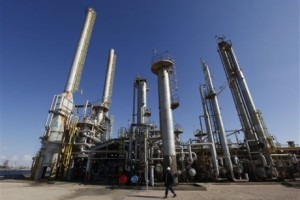By Sami Zaptia.

London, 25 April 2021:
Libya is studying the construction of oil refineries in various regions through local and foreign Public Private Partnership (PPP) ventures.
The news was revealed yesterday after its Minister of Economy and Trade, Mohamed Hwej, held a meeting with the Minister of Oil and Gas, Mohamed Aoun, yesterday at the Economy Ministry in Tripoli.
The meeting discussed the importance of establishing oil refineries in different areas to produce fuels and convert natural gas into high-quality diesel in order to cover domestic demand. The meeting also discussed the role of government and ministries in stimulating investment in the oil industries sector in partnership with the local and foreign private sector.
The Minister of Economy and Trade emphasized that the government, through its competent ministries, will take all the legislative and executive measures and measures necessary to support these projects, provide facilities for local and foreign private companies, and provide technical support for them. These will be in cooperation with specialized national companies to implement these projects in different areas, to be determined according to needs, in order to achieve local fuel production instead of importing fuel.
Background
It will be recalled, however, that the plan to build new regional refineries is not new. On 30 October 2013, the then Prime Minister Ali Zeidan announced that a decision had been taken by his government to build two new oil refineries.
The larger of the two refineries with a capacity of 300,000 barrels would be built in Tobruk while the smaller one with a 50,000 barrels capacity would be in the southern town of Ubari. Zeidan had stressed that these would be to produce fuel for local consumption.
Decentralization, diversification and import substitution
Building new refineries would tick many boxes. It is one of the easiest and obvious means of diversification of incomes and reducing the cost of imports such as refined fuel products.
Libya needs to develop its downstream capacity in order to take advantage of its natural local advantages would help the economy and diversification.
The announcement by Zeidan that the Ubari refinery would have a capacity of only 50,000 barrels, however seemed at odds with expert views that refineries need to be of a capacity of at least 300,000 to make them commercially competitive.
It is unclear why its capacity is not increased for possible export to sub-Saharan Africa, for example.
Thinni discusses building two new oil refineries with foreign company | (libyaherald.com)
Two new oil refineries approved – Zeidan | (libyaherald.com)
Libya needs to build world class refineries – RPS Energy | (libyaherald.com)







